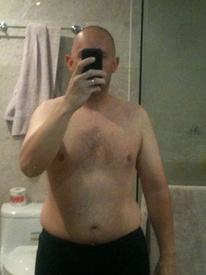Body Fat % suddenly increased but losing weight! Why?

claire671
Posts: 93 Member
After losing 50lbs and getting my body fat down from 32% to 22% all was going brilliantly. I checked my body fat % two weeks ago and managed to get to 21.9% but just three days ago it read 28.8%!! My weight has dropped again but is that possible to gain that much fat in a week and a half? But be losing weight at the same time?
I've not been exercising the last week as life has been pretty rough, I've also not been reeling very well. Headaches, dizzy spells and feeling exhausted. My scales also allow me to check water percentage and that has gone from 58% to 52%.
Any advice would be appreciated!
I've not been exercising the last week as life has been pretty rough, I've also not been reeling very well. Headaches, dizzy spells and feeling exhausted. My scales also allow me to check water percentage and that has gone from 58% to 52%.
Any advice would be appreciated!
0
Replies
-
After losing 50lbs and getting my body fat down from 32% to 22% all was going brilliantly. I checked my body fat % two weeks ago and managed to get to 21.9% but just three days ago it read 28.8%!! My weight has dropped again but is that possible to gain that much fat in a week and a half? But be losing weight at the same time?
I've not been exercising the last week as life has been pretty rough, I've also not been reeling very well. Headaches, dizzy spells and feeling exhausted. My scales also allow me to check water percentage and that has gone from 58% to 52%.
Any advice would be appreciated!
The scales are not accurate under all conditions. You clearly did not gain that much fat. don't put too much importance on any one reading, especially from an electronic device.
Have someone check it with calipers or go get measured at one of those hydro-measure thingies.
Rest easy, you did NOT gain pounds and pounds of fat.
PS, you look great in your LBD. Hope that takes your mind off the lies your scale told you. :^)0 -
As above, totally inaccurate. Callipers are the best way IMO. Try not to be obsessed with the scales. The mirror tells you the truth, not scales. Example: My scales tell me I've lost 6 lbs this week. I don't think so!0
-
I thought there would be no way to gain that in a week, just my scales still say the same this morning so that is two different occasions getting the same reading. What is my body up to!0
-
Yeah also agree, use callipers if you want to check body fat. I don't see how standing on a scale will tell you your body fat percentage, and if it did i couldn't see it being very accurate.0
-
How did you measure your BF? I ask because most methods that involve scales or handheld monitors are stupidly inaccurate. I used the one at my gym and it told me I was 25% BF about 3 weeks ago, which I clearly wasn't.0
-
Hydration levels can throw it off.0
-
weight fluctuations are perfectly normal, my body weight varies by 6lbs some weeks depending on what ive eaten how much exercise ive done, how much water i drank etc etc sometimes i look more muscley sometimes i don't, your best bet as always is to keep up the good work, ignore the finer details picture yourself 6 months ago and look at yourself now, that is the result of your efforts, not what the scale or bf calculator tells you, keep the faith!0
-
How did you measure your BF? I ask because most methods that involve scales or handheld monitors are stupidly inaccurate. I used the one at my gym and it told me I was 25% BF about 3 weeks ago, which I clearly wasn't.
My scale has pads that I make sure I stand over and this measures it.0 -
Inaccurate scale reading.0
-
I'm really not bothered about my weight now that I've reached my goal, it's my BF% I'm working on and to see that jump up, well you can understand why I'm concerned. Thank you for your suggestions I will see if I can ask a gym to measure it more accurately. I'm not a member anywhere though so buying that scale was my way of keeping an eye on it at home, hate to think it's been inaccurate this whole time!0
-
Most machines are extremely inaccurate. Even Dexa scans which are regarded as the most accurate have a large margin for error.0
-
Ignore scales for body fat readings. My scales have that feature and I check it every now and again. It's ridiculous. I know my body fat is 11%. One minute the scales say 15% then literally 2 mins later 17%. Use callipers. Much more reliable.0
-
The scales typically measure by electrical inductance, and this measure can be thrown off by water retention, food in your stomach, urine in your bladder, etc. I use mine as rough gauge of how I'm doing, but try to always and only get on the scale first thing in the morning after morning ablutions. The number is still not incredibly accurate, but it does tend to be consistent (that is, the absolute body fat % is wrong, but the change in body fat % is pretty close) based on checking it against calipers at my dieticians office over several weeks. Try to calibrate the scale measurements against some better measure and make sure that the conditions are as close to identical as possible each time you weigh. You'll get better results that way, but to be honest, there's really no subsitute for a good old-fashioned tape measure.0
-
'ello!
Those scales measure body fat % by sending electric signals round your body and measuring how 'easily' the signal flows (put very simply!). Being dehydrated, or having lower water levels, will definitely have an impact on this, not just how much actual fat there is.
Sooooo, if your water reading has gone down then there's the direct correlation with your fat reading going up. Don't take the readings at face value but look at them altogether to see which might be impacting on another.
Old fashioned calipers are supposed to be the best way to accurately measure body fat.0 -
'ello!
Those scales measure body fat % by sending electric signals round your body and measuring how 'easily' the signal flows (put very simply!). Being dehydrated, or having lower water levels, will definitely have an impact on this, not just how much actual fat there is.
Sooooo, if your water reading has gone down then there's the direct correlation with your fat reading going up. Don't take the readings at face value but look at them altogether to see which might be impacting on another.
Old fashioned calipers are supposed to be the best way to accurately measure body fat.
Thank you, this makes a lot of sense. I did wonder if the two were related. Off to go and drink plenty water!0 -
I am not sure if this is the case you are currently experiencing, but squishy fat/whoosh it is an interesting phenomenon tied into suddenly elevated scale BF% readings despite actual fat loss. In this case though, it's my understanding that even calipers will not display the drop in BF% until after the whoosh:
http://www.bodyrecomposition.com/fat-loss/of-whooshes-and-squishy-fat.html0 -
Have you tried changing the batteries?0
-
I also have a scale that measures bodyfat%, TBW -which is water % and it measures muscle % and it has gone up in the body fat because you haven't exercises for a while, my scale does it every time the day after I have exercised it shows a lower body fat and higher muscle, but if it has been awhile where I haven't exercised it shows a much higher body fat% and a little lower muscle or sometimes not lower muscle. It's like the scale is reacting on the tightness and restitution of the muscles.
You can only use you home scale as an estimate and you should always take into consideration what you have done and eaten the day or whole week before. When you start exercising again you will see the scale reacting by drastically dropping you bodyfat and probably upping your water :-)0 -
Ignore scales for body fat readings. My scales have that feature and I check it every now and again. It's ridiculous. I know my body fat is 11%. One minute the scales say 15% then literally 2 mins later 17%. Use callipers. Much more reliable.
^ this. that feature is simply a marketing gimmick to make the scale more expensive. trust me as an engineer when i say this, you cannot trust that measurement. it's pretty much a random number you're getting because the actual result itself is subject to all sorts of instrumentation and estimation errors.
http://weightology.net/weightologyweekly/?page_id=218
calipers have their own issues. the only somewhat accurate method is to get yourself into a tank of water where your mass and volume can be measured.0 -
I also have a scale that measures bodyfat%, TBW -which is water % and it measures muscle % and it has gone up in the body fat because you haven't exercises for a while, my scale does it every time the day after I have exercised it shows a lower body fat and higher muscle, but if it has been awhile where I haven't exercised it shows a much higher body fat% and a little lower muscle or sometimes not lower muscle. It's like the scale is reacting on the tightness and restitution of the muscles.
You can only use you home scale as an estimate and you should always take into consideration what you have done and eaten the day or whole week before. When you start exercising again you will see the scale reacting by drastically dropping you bodyfat and probably upping your water :-)
I think it's because when it measures resistance, it has difficulty distinguishing water from actual lean body mass. When you have just worked out, your muscles are all "pumped up" for repairs (often you can even see the swelling visually), and the scale counts that weight in your LBM == muscle.0 -
After losing 50lbs and getting my body fat down from 32% to 22% all was going brilliantly. I checked my body fat % two weeks ago and managed to get to 21.9% but just three days ago it read 28.8%!! My weight has dropped again but is that possible to gain that much fat in a week and a half? But be losing weight at the same time?
I've not been exercising the last week as life has been pretty rough, I've also not been reeling very well. Headaches, dizzy spells and feeling exhausted. My scales also allow me to check water percentage and that has gone from 58% to 52%.
Any advice would be appreciated!
The scales are not accurate under all conditions. You clearly did not gain that much fat. don't put too much importance on any one reading, especially from an electronic device.
Have someone check it with calipers or go get measured at one of those hydro-measure thingies.
Rest easy, you did NOT gain pounds and pounds of fat.
PS, you look great in your LBD. Hope that takes your mind off the lies your scale told you. :^)
yah, home scales are not accurate for body fat and the reading can vary greatly.0
This discussion has been closed.
Categories
- All Categories
- 1.4M Health, Wellness and Goals
- 396.9K Introduce Yourself
- 44.2K Getting Started
- 260.9K Health and Weight Loss
- 176.3K Food and Nutrition
- 47.6K Recipes
- 232.8K Fitness and Exercise
- 454 Sleep, Mindfulness and Overall Wellness
- 6.5K Goal: Maintaining Weight
- 8.7K Goal: Gaining Weight and Body Building
- 153.3K Motivation and Support
- 8.3K Challenges
- 1.3K Debate Club
- 96.5K Chit-Chat
- 2.6K Fun and Games
- 4.5K MyFitnessPal Information
- 16 News and Announcements
- 18 MyFitnessPal Academy
- 1.4K Feature Suggestions and Ideas
- 3.1K MyFitnessPal Tech Support Questions













